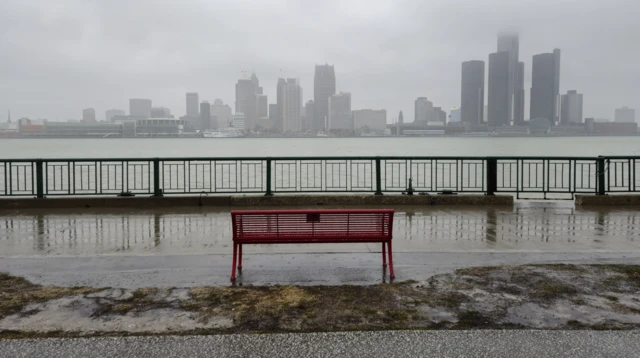Ursula von der Leyen speakspublished at 04:21 BST 3 AprilBreaking
Ursula von der Leyen, president of the European Commission is speaking now on Trump's tariffs. Please stay with us as we bring you the latest.
Wall Street suffers its worst day since 2020 after Donald Trump announced a raft of worldwide tariffs last night
In Canada, Prime Minister Mark Carney announces 25% tariffs on certain US vehicles
The UK has drawn up a 400-page list of US products it could hit with tariffs - Henry Zeffman says it is a toughening up of Starmer's stance
Trump announced 10% tariffs on most countries - including the UK - from Saturday, with higher rates on some of America's biggest trading partners from 9 April. We cover the basics in five key questions here
As part of Your Voice, Your BBC News, our experts are answering your questions - including whether the UK is enjoying a "Brexit benefit" as well as the impact of tariffs on US customers and products
How the US stock market is reacting to Trump’s tariffs…in 45 seconds
Edited by Emily McGarvey
Ursula von der Leyen, president of the European Commission is speaking now on Trump's tariffs. Please stay with us as we bring you the latest.
 Tessa Wong
Tessa Wong
Reporting from Singapore
For decades, America has insisted it is a true ally of Taiwan, with the two places forging ever-closer economic and military ties.
Taiwan's computer chip industry has made it invaluable to the US, which also sees the island as a bulwark against China's expansionist claims in the South China Sea.
Former US President Joe Biden had vowed to protect Taiwan from a Chinese attack.
But under Donald Trump, that close relationship has been called into question.
He has previously said the island "stole our chip business" and that "Taiwan should pay us for defence".
Recently he pushed for the Taiwanese chip manufacturer TSMC - the world's largest - to invest further in their factory in Arizona.
Now, he has slapped a surprisingly hefty 32% tariff on imports from Taiwan.
For several years, there has been a growing suspicion in Taiwan that the US is "hollowing out" the island of its resources.
It has largely been fuelled by pro-China hawks but also disinformation campaigns from China.
This narrative, known as yimeilun or US scepticism, portrays the US as a fickle friend who will abandon Taiwan once it has outlived its usefulness, and that the Taiwanese are better off "reunifying" with China.
Most Taiwanese still believe the US is their ally.
Yimeilun is not a widespread narrative in Taiwan yet. But with Trump's actions like today's tariff, it may find fertile ground.
President Donald Trump unveiled 10% tariffs on all imports into the US, with certain countries hit with steeper tariffs. The watershed moment for global trade is already impacting stock markets.
This is what the import taxes mean for the US and countries around the world.
Watch: Three things to know about Trump's tariffs announcement
Koh Ewe
Live page reporter
We now have the latest statement from China's Commerce Ministry, urging the US to "immediately revoke these unilateral tariff measures and to resolve trade disputes properly through equal dialogue with its partners".
"China firmly opposes this move and will take resolute countermeasures to safeguard its rights and interests," a spokesperson said.
Earlier, Chinese state media Xinhua News Agency published a commentary calling the tariffs "self-defeating bullying" and said Trump was "turning trade into an over simplistic tit-for-tat game".
China is perhaps the country that's been hit hardest after Trump's announcement today, with an additional 34% tariff imposed on all Chinese goods - on top of the 20% that had already been levied.
 Tiffanie Turnbull
Tiffanie Turnbull
BBC News, Sydney
Watch: Australia's PM reacts to Trump’s ‘Liberation Day’ tariffs
Compared to some of its regional neighbours, Australia got off lightly with a 10% tax on all its exports to the US.
But the decision has stirred anger down under with Prime Minister Anthony Albanese saying it has "no basis in logic" and is "totally unwarranted".
"This is not the act of a friend," he said.
The countries have a free trade agreement, but Trump has justified the new tariffs by pointing to what he called non-tariff trade barriers, like Australia's biosecurity rules which block fresh US beef.
Last month, Trump also slapped tariffs of 25% on Australian aluminium and steel.
But Albanese said Australia will not retaliate with tariffs though, and is instead seeking a return to the negotiating table.
It's bad timing for the country, which is in the middle of an election campaign focussed on lowering the cost of living - and extra tariffs certainly aren't going to help.
Peter Hoskins
Reporting from Singapore
We're now getting a wider picture of how investors are reacting to Trump's sweeping tariffs.
In Asia, major stock indexes have fallen in morning trading as concerns grow over the threat of a global trade war.
Stock markets in mainland China have just opened with the Shanghai Composite index trading broadly flat, while Hong Kong's Hang Seng is down by 1.2%.
The Nikkei 225 in Tokyo is down by 2.9%, the Kospi in South Korea is down by 1.7%, and Australia's ASX 200 is around 1.2% lower.
Futures tied to the Dow Jones Industrial Average were down by around 800 points, or 1.8%, while S&P futures fell 2.7%, and the tech-heavy Nasdaq 100 futures were 3.3% lower.
Futures are contracts to buy or sell an underlying asset at a future date. In this case, they are an indicator of how US stock markets are expected to trade when they open on Thursday - although futures trading can be volatile.
 Image source, Getty Images
Image source, Getty ImagesPenguins are the best known inhabitants of Heard Island
We've been taking a closer look at the list of places targeted by Trump's recent tariff announcement.
According to the list released by The White House on X, the Trump administration will place a 10% tariff on goods from the Heard and McDonald Islands - an Australian territory that is closer to Antarctica than anywhere else, and is completely uninhabited.
The US president also announced a 10% tariff on goods from Svalbard and Jan Mayen, two remote Norwegian territories not far from the North Pole, that have a combined population of around 2,500 people.
It is unclear what goods are exported by any of these territories.
On Wednesday afternoon, Donald Trump announced sweeping new tariffs on goods entering the US that could upend global trade. Here's what you need to know:
 Nikhil Inamdar
Nikhil Inamdar
India business correspondent, in Mumbai
Asian economies are among the hardest hit by Donald Trump’s tariffs - 34% for China, 46% for Vietnam and 49% for Cambodia.
Relatively speaking, India has fared better.
But at 26%, tariff rate on India is still steep and will severely affect major "labour intensive exports", says Priyanka Kishore of Asia Decoded.
"That will likely have a knock-on impact on domestic demand and headline GDP", at a time when growth is already stuttering, according to Kishore.
But India's electronics exports may potentially benefit, as higher tariffs on places like on Vietnam could lead to some re-routing of trade.
That is unlikely to mitigate the overall negative growth impact of Trump's salvo, though.
Unlike Canada, Mexico or the European Union, India has so far adopted a conciliatory approach to Trump and is negotiating a bilateral deal with the US. Whether this latest move by the administration triggers a retaliation in Delhi will be very closely watched.
Indian pharma - its largest industrial export at some $13bn - will be breathing a sigh of relief however, as medicines are exempt from these "reciprocal" tariffs.
More reactions are coming in from international leaders in response to the tariffs announced by Donald Trump.
The BBC's Sarah Smith explains Trump's tariffs in 37 seconds
 Image source, Getty Images
Image source, Getty ImagesThe price of gold continues to reach record highs, amid uncertainty surrounded the global economy in the wake of Trump's tariff war.
By Wednesday afternoon, the spot price for a gold ounce surged to $3,118 (£2,392), a climb of 0.3%.
The reason for the jump is not just linked to the trade uncertainty, but also is partly due to turmoil in the Middle East and Europe.
Earlier this month, the cost of a gold ounce hit $3,000 for the first time.
Gold is seen as a safer asset for investors and is often sought after in times of economic instability.
Read more here.
Peter Hoskins
Business reporter, BBC News Singapore
Major stock markets in the Asia-Pacific opened lower on Thursday morning.
Japan's benchmark stock index, the Nikkei 225, was down by 4% in early trading.
It comes after the US president announced a 24% tariff on imports from Japan.
Meanwhile, Australia's ASX 200 was around 2% lower, after Trump imposed a baseline 10% tariff on the country.
Top lawmakers Schumer and Johnson react to Trump's tariffs
The US Senate has narrowly voted to approve a bill that would block Trump's previously announced 25% tariff on Canada from going into effect.
The bill passed the Republican-controlled Senate by a vote of 51 to 48. Four Republicans crossed party lines to support the Democrat-sponsored bill.
Analysts say it is extremely unlikely to be taken up by the House of Representatives, which is also controlled by Trump's party. Even if it were to pass the House, Trump could veto the bill.
Susan Collins, a Republican Senator from Maine who was among those to vote for the bill, warned recently: "The tariffs on Canada would be detrimental to many Maine families and our local economies."
The other Republicans who supported it were Rand Paul of Kentucky, Lisa Murkowski of Alaska and Mitch McConnell of Kentucky.
Earlier today, Trump took to social media to call on the Republicans to "fight the Democrats wild and flagrant push to not penalize Canada".
Senator Tim Kaine, the Virginia Democrat who sponsored the bill, wrote in the Washington Post last week that the law Trump has invoked for his tariffs - the National Emergencies Act of 1976 - includes a provision that allows any senator "to force a vote to block emergency powers being abused by the president".
US-Canada trade is heavily intertwined, and economists have warned of dire consequences if Canada retaliates and a trade war with a close ally unfolds.
The rare rebuke of Trump by Republicans in Washington DC may be symbolic, but it offers a sharp contrast to his White House speech hours ago proclaiming today "liberation day".
 Jonathan Josephs
Jonathan Josephs
BBC business reporter
Since President Trump came back to the White House in January, both China and Canada have taken their complaints against his tariffs to the World Trade Organization.
The Geneva-based body is designed to decide the rules of international trade and enforce them. However, for the last five and a half years, it has been limited in its ability to do that.
President Trump blocked the appointment of any new judges during his first term, and there now aren't enough to address appeals.
The United States claims the system overreached its jurisdiction to the detriment of the US. President Trump has also argued that the WTO system allowed China an unfair advantage in the global trade system.
With the organisation at an impasse, it is hard to see what action other countries might take in response to the latest tariffs beyond imposing their own trade barriers.
Peter Hoskins
Business reporter, BBC News Singapore
US stock market futures have fallen sharply after Trump unveiled sweeping import taxes on countries around the world.
Investors are concerned about the threat of a global trade war and its potential impact on the American economy.
Futures tied to the Dow Jones Industrial Average were down by around 1,000, or 2.4%, while S&P futures fell 3.5%, and the tech-heavy Nasdaq 100 futures were 4.4% lower.
Futures are contracts to buy or sell an underlying asset at a future date. In this case, they are an indicator of how US stock markets are expected to trade when they open on Thursday.
 Ali Abbas Ahmadi
Ali Abbas Ahmadi
Reporting from Windsor, Ontario
I have been speaking to Manny Cardoso, the secretary and treasurer for the union at the Stellantis automobile plant, Windsor’s largest employer.
He paints a picture of a tightly interconnected community, and highlights how tariffs impacting Windsor’s three car plants would have huge knock-on effects on the city.
“If you take those employers out, we would look like Flint, Michigan probably pretty fast,” he says, referencing the US city that has struggled for decades after several car manufacturing plants shut down in the 1990s.

Windsor residents had a front row seat to see the decline of Detroit after the automobile industry there collapsed
 Ana Faguy
Ana Faguy
US Reporter
 Image source, Ben Maurer
Image source, Ben MaurerBefore Donald Trump was elected, Ben Maurer, a Pennsylvania man, was talking about tariffs.
He's long thought they were the solution to America's hardships and so when he heard about Trump's latest - and steepest - tariffs today, he described it as a "necessary evil".
"We're probably going to feel some pain for about six months and I would be willing to bet, after about six months, there will be noticeable changes," says Maurer, who works as a trucker.
Maurer says the US has been taken advantage of in the global trade market.
He speaks fondly of decades past when his Pennsylvania town had two steel mills that employed many. Both have since closed, but with tariffs like the kind Trump imposed today, Maurer thinks the US will get those jobs and others back: "It's a step in the right direction," he says.
"[Trump's] out to prove a point, that we're here to get stuff done and we're going to get stuff done."
Rating agencies that give countries credit scores are weighing how Trump's tariffs will affect the US and other economies.
So far, it's not looking good.
Olu Sonola, head of US Economic Research, at Fitch Ratings, said that the US tariff rate on all imports is now roughly 10 times last year's rate, around 22%. The country hasn't had levies that high in more than 100 years.
"This is a game changer, not only for the US economy but for the global economy," Sonola wrote.
"Many countries will likely end up in a recession. You can throw most forecasts out the door, if this tariff rate stays on for an extended period of time."
Fitch cut the credit score of the US in 2023.
Moody's Analytics has been warning the US could tip into a recession soon, and has also said the country's finances may experience a multi-year decline from its growing budget deficits and expensive debt.
Its chief economist Mark Zandi told AFP on Thursday that a trade war resulting from Trump's tariffs would damage the US economy.
"If this trade war continues through Labor Day (on 1 September), the US economy will likely suffer a recession this year," he said.